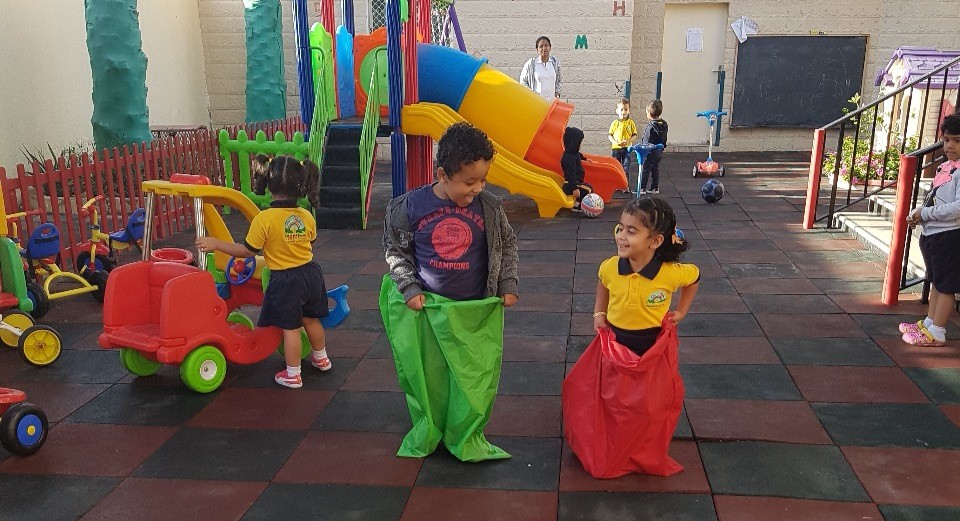To Compete or Not to compete? by Dana Smith Bader in OTR Blog
We can all agree that sports, or at least exercise, is good for our kids. Making sure children have a dedicated time when they are active, exercising, and, preferably, enjoying being outdoors is essential to keeping them healthy. By taking part in weekly sports classes or team sports children can be active with expert coaching to ensure they are engaging in the right kind of exercise for their age group. They can even develop essential social skills by regularly interacting with their teammates. However, one drawback is whether or not they can deal with the competition. To compete or not to compete, really is the question.
Personally, I do not think there is anything wrong with competition. In fact, I think competition can teach our children several important life lessons. However, I think how we, as parents, deal with competition and teach our children to deal with it are the parts of competition that usually get muddled up. Today, we have two types of parents. The first type is super competitive and creates stress for everyone. This parent tries to live vicariously through his or her child and ends up acting like a nut at every game and teaching the child that winning is the most important objective of youth sports, making the whole affair stressful and toxic. Parent number two is the opposite. This is the peace, love, and hugs parent who thinks that sports are good as long as everyone can win and everyone can get a prize and everyone can feel good about the sport and each other. This parent, unfortunately, lives in La La Land because competitive sports have winners and losers, and one of the important life lessons of competitive sports is learning to ‘be a good sport’ and learning to lose or win graciously.
Competition drives us to learn at a faster rate and perform at a higher level. – When a big game is looming, and we know a prize is just within our reach, we work harder and faster. When we are playing that important game, we push ourselves harder. In doing so, we often surprise ourselves with what we are capable of achieving. In other words, competition, especially when winning big is on the line, teaches us to bring our best effort.
Competition teaches us to manage our nerves. – When something is outside of our comfort zone or pushes us to perform, it is normal for us to feel nervous. Competition often brings on nervousness and teaches us how to manage our nerves so we can perform our best, a skill that we can also use when taking exams, interviewing for a big job, or giving an important presentation to our boss.
Competition teaches us to take risks. – Once we realize that competition is not scary, we can take risks. We can grow our confidence to do things that might be hard or uncomfortable.
Competition teaches us to play by the rules. – When playing competitive sports, it is essential that we understand the rules and play by them. Learning how to play by the rules in a fun environment and understanding that the rules are there to keep the game fair and safe is a valuable lesson that everyone can benefit from. It can also be a great influence in school and in life.
Competition teaches us how to lose. – No matter how great a child is at sports, at some point, he or she will experience losing. By taking part in competitive sports when they are young, children can learn to lose in a safe, supportive environment. By learning that it is okay to lose and being gracious and controlling emotions, they can develop their tolerance to stress and build their character. They can also learn to congratulate the winners and think about how they can improve next time without taking the loss as a personal failure.
Competition teaches us commitment and how to set goals for success. – Training for competitive sports often involves doing something we do not want to do. The training may be tough, but it is part of what we must do to achieve our goal of winning. Therefore, competitive sports teach us to set goals for success and then do what we have to do, even if it is hard, to achieve that success.
Competition can build self-esteem and confidence in children. – From teammates telling children they have done a great job to the children accepting new challenges and accomplishing goals, competitive sports can be a real boost to children’s self-esteem and confidence. For children who love sports, taking part in competitive sports can be a great way to feel a sense of pride in their achievements and grow in their confidence.
Competition teaches teamwork. – Teamwork is one of the most important skills people look for when hiring new staff, and competitive sports teaches us how to work in a team. By recognizing the skills of others, supporting their teammates, and encouraging each other, children playing competitive sports build teamwork and gain an understanding of its benefits at a young age.
As a result, there is no doubt in my mind that competitive sports can be beneficial for our kids, as long as we, as parents, keep things in perspective and focus more on the process and its benefits and less on the final result of winning or losing. When your children participate in competitive sports, they may not win every game, but they will have a much better chance of winning in life.
Good hand hygiene is perhaps the most important practice for keeping us healthy. Therefore, it is essential that we teach our children not only when to wash their hands, but also exactly how to wash them. First, children should be taught to wash their hands after attending the toilet, after playing outside, before eating food, before sleeping, and after coughing or sneezing. More important, they should learn a very specific method for washing their hands.
- First, they should turn on the water and rinse their hands.
- Next, they should take the soap and rub it on their hands thoroughly for about half a minute. Also, they should make sure they clean the whole hand up to the wrist, between each finger, and under their finger nails.
- After cleaning their hands with soap, they should rinse them again thoroughly with clean water.
- Finally, they should use a clean, dry towel or paper towel to dry their hands before leaving the bathroom.
In addition, to washing their hands carefully, children should have their nails cut at least weekly. Also, they should be taught to cough or sneeze in a tissue or handkerchief, or into their elbow if they do not have a tissue at hand. Sneezing or coughing in their hands only causes them to spread germs to other surfaces that they touch if they do not wash their hands afterwards.
In addition to good hand hygiene, children should be taught how to care for their hair, bodies, feet, and teeth. Children should learn to brush their teeth after every meal. Also, it is preferable for children to bathe daily and to wash their hair at least two to three times per week. They should also learn to wash their feet well when they take a bath and cut their toenails at least weekly.
After using the toilet, children need to learn how to wash and dry themselves properly. In the Middle East, we are lucky enough to have toilet hoses available for proper washing after we use the toilet. Therefore, parents should take extra care to teach their children how to wash after using the toilet. It is also important to stress the importance of drying their bottoms after washing to prevent rashes or infections.
Last, but not least, children need to learn the basics of good food hygiene. If your little ones like to cook with you, it is important for them to learn that all vegetables and fruit should be washed. Also, they can learn to wash meat pieces before cooking them to remove excess blood or other matter. They must also learn to wash their hands and tie their hair back, as necessary, before beginning any type of food preparation even if they plan to wear gloves during the preparation process. In general, they can also learn that it is not healthy to eat while walking on the street due to the excess dirt and dust in the air, and they must also remember never to sneeze or cough directly on food. Finally, they need to remember to wash their hands after handling food or eating.
Good personal hygiene habits will help your child stay healthy, ward off illnesses, maintain a healthy body image, and develop a health-conscious personality. Of course, keeping clean doesn’t mean that your child can never get dirty. It is important for children to enjoy exploring, especially outdoors, and being creative with messy play. However, it is equally important for them to know how to clean up afterwards. If you want to have a healthy child, you need to teach healthy hygiene habits!
by Dana Smith Bader, Director, Over The Rainbow Nursery

